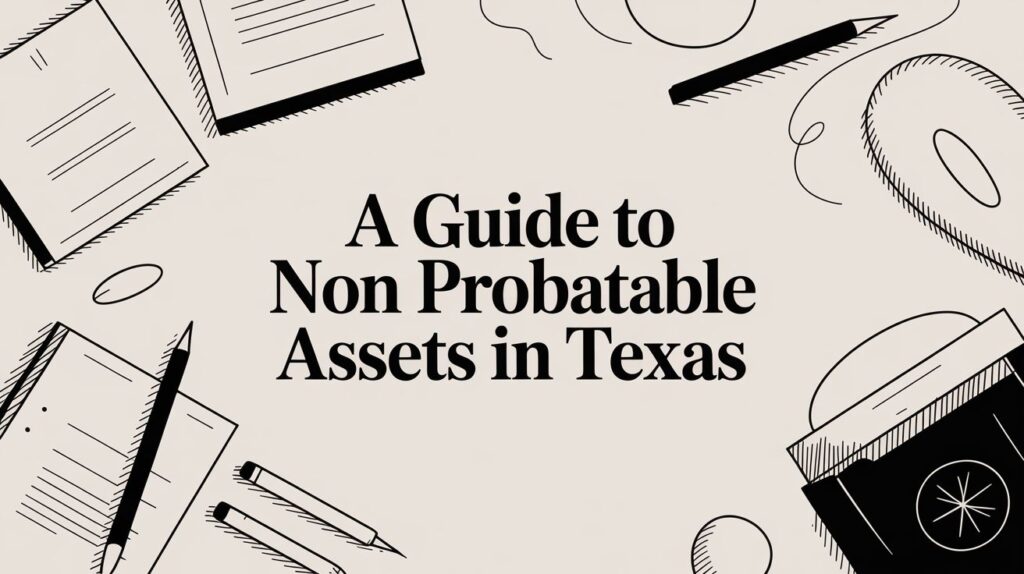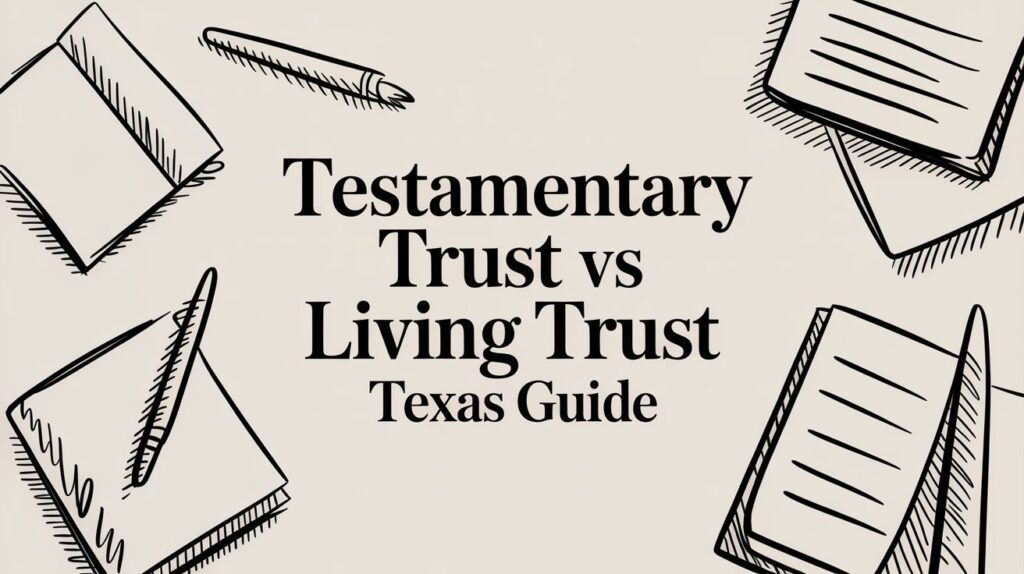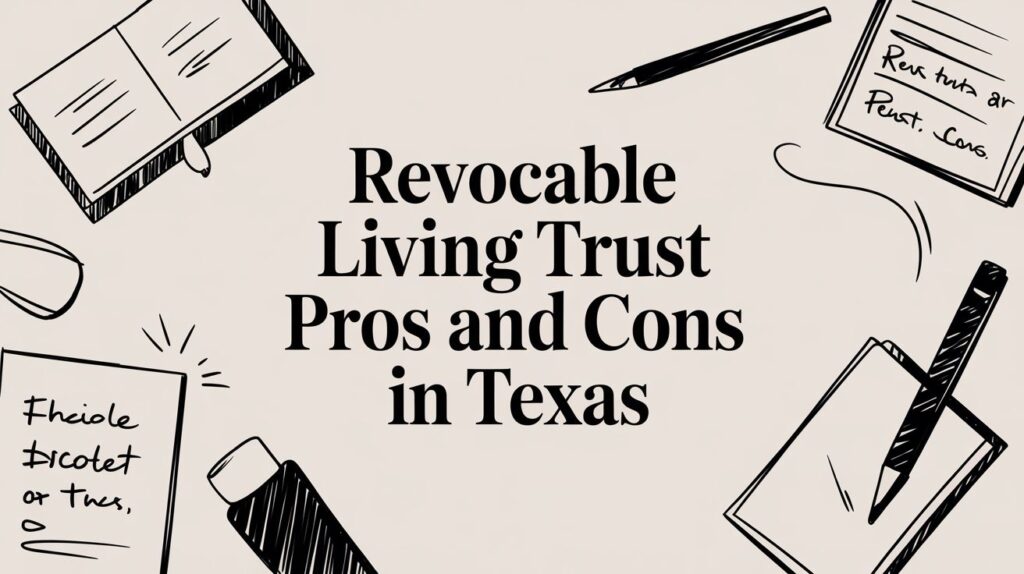When a loved one passes away, the last thing your family needs is to get tangled up in a long, expensive legal process. For many families in Texas, the small estate affidavit (SEA) is a compassionate and efficient alternative. It’s a simpler, faster, and more affordable path than traditional probate, designed for estates where the assets are modest.
This process allows heirs to transfer property without the full-blown cost and time commitment of formal court administration, providing a measure of relief during a difficult time.
Understanding the Small Estate Affidavit in Texas

Losing someone is overwhelming enough without the added stress of a complex legal system. The Texas Legislature created the small estate affidavit as a more humane solution to ease that burden. In plain English, this legal document informs a probate court that a loved one's estate is small enough to skip the formal, and often costly, probate process.
Think of it as the express lane for settling an estate. Instead of the court appointing an executor and holding multiple hearings, the heirs can use this sworn statement to collect assets, like funds from a bank account or the title to a car.
Who Qualifies for a Small Estate Affidavit
Not every estate can use this shortcut. To qualify, the estate must meet strict criteria laid out in the Texas Estates Code, Chapter 205. This isn't a one-size-fits-all tool, but it's incredibly helpful for those who fit the bill. The two biggest requirements are:
- Asset Limit: The total value of the estate's assets—not including the decedent's homestead and other exempt property—cannot be more than $75,000.
- Debt Status: The estate's assets must be worth more than its known debts. You cannot use an SEA if the debts outweigh the assets.
The use of this affidavit has increased significantly since the asset limit was raised to $75,000. This change was a deliberate move to help more families avoid the complexities of a full probate, increasing filings by an estimated 25% to 30%.
Key Insight: That $75,000 limit is often misunderstood. It excludes the value of the primary home (the homestead) and certain personal property, like one vehicle per family member and home furnishings up to a certain value. This means an estate can actually be worth more than $75,000 in total and still qualify.
To help you see if this might be an option for your family, here's a quick checklist to review.
Quick Eligibility Checklist for the Texas Small Estate Affidavit
Use this table to quickly determine if your loved one's estate may qualify for the Small Estate Affidavit process in Texas.
| Eligibility Requirement | Does This Apply to Your Situation? |
|---|---|
| The person died without a Will. | |
| At least 30 days have passed since the date of death. | |
| The total value of the estate is $75,000 or less (excluding homestead and exempt property). | |
| The value of the estate's assets is greater than its debts. | |
| The only real property owned was the decedent's homestead. | |
| All heirs can be located and are willing to sign the affidavit. |
If you can answer "yes" to these points, the SEA is likely a strong possibility. It’s always best to review the specifics with a probate attorney, but this gives you a solid starting point.
When the Affidavit Is the Right Choice
This process is perfect for straightforward situations. Let's say a parent passes away leaving only a small checking account, a paid-off car, and their primary home. If their non-exempt assets are under $75,000 and they only have minor debts (like a final utility bill), their children can likely use a small estate affidavit to get the car title transferred and access the bank funds.
However, if the estate is more complex—maybe it includes multiple properties, business interests, or significant debts—a formal probate will be necessary. Knowing the difference is crucial. You can learn more by checking out our guide on when small estate probate in Texas is necessary.
While an SEA offers a simplified path, some estates just need more formal handling. If you're weighing your options, understanding various strategies for selling a house during probate can also provide helpful context. The small estate affidavit is a testament to Texas law’s goal of giving families a practical way forward during a tough time.
Preparing to Fill Out the Affidavit Form
Before a single word is written on the official small estate affidavit Texas form, the real work begins. Proper preparation is the single most important step you can take to make this process go smoothly. Think of it less like filling out a form and more like creating a perfect snapshot of your loved one's financial and family life on the day they passed.
This isn't just about being organized for your own sake. The probate court needs this level of detail to approve the affidavit and allow you to move forward. A solid foundation here prevents frustrating delays and rejections down the road.
Your Document Gathering Checklist
First, start collecting the necessary paperwork. Having these documents in front of you will provide all the facts you need to fill out the affidavit with confidence.
- Official Death Certificate: You'll need a certified copy, not a photocopy. This is non-negotiable, as it officially establishes the date and location of death.
- The Decedent's Will (If One Exists): Your first job is to confirm there is no Will. If a valid Will is discovered, the small estate affidavit is not an option, and you'll need to look at other probate paths, like our firm’s services for Wills & Trusts.
- Financial Statements: Track down recent bank statements, retirement account summaries, stock certificates, or anything else that shows the value of their financial assets.
- Vehicle Titles: If they owned a car, truck, or boat, you need the official title document.
- Property Deeds: The deed to their homestead (the house they lived in) is crucial for proving its status as exempt property.
- Known Bills and Debts: Gather every recent credit card bill, medical statement, mortgage invoice, or any other notice of a debt they owed.
Creating a Clear Inventory of Assets and Debts
With your documents in hand, it's time to make two lists: one for assets and one for liabilities (debts). This inventory is the heart of the affidavit, and it demands complete accuracy.
Listing the Assets
For every asset, you need to find its fair market value on the date of death. This isn't what they paid for it; it's what it could reasonably be sold for. You have to be specific.
Let's walk through an example. Say Maria passed away, leaving a checking account, a 2018 Toyota Camry, and her furniture. Her daughter, Sofia, is handling the SEA.
- Checking Account: The bank statement from the date of death shows a balance of $4,500.
- 2018 Toyota Camry: Sofia checks Kelley Blue Book and calls a local dealer to get a realistic value. She determines its fair market value is $16,000.
- Household Furnishings: These are generally considered exempt property, so while Sofia lists them, their value typically doesn't count toward the $75,000 limit.
Listing the Liabilities
This part is just as important. You must list every single known debt of the estate. The court needs to see that the assets are worth more than the debts, so being thorough and honest here is vital.
Continuing with our example, Sofia finds a final hospital bill for $2,500 and a credit card with an outstanding balance of $1,000. She lists these as the estate's total known liabilities, which come to $3,500.
Identifying Heirs and Witnesses
Finally, you need to identify every legal heir and find two people who can serve as witnesses. This is where many people get tripped up.
Under Texas intestate succession laws (the rules for who inherits when there's no will), heirs are usually the surviving spouse, children, or other immediate relatives. You must list all of them—even a distant relative with a claim—along with their addresses and relationship to the person who died. For a more detailed breakdown of how heirs are determined, our guide on the Texas Affidavit of Heirship is a great resource.
You will also need two disinterested witnesses. This is a specific legal term that means the person:
- Knew the decedent well and is familiar with their family history.
- Will not inherit anything from the estate. They cannot be an heir.
- Is willing to sign the affidavit and swear under oath that the family history you've provided is true.
A longtime family friend, a trusted neighbor, or a clergy member often makes a great witness. Their job is simply to verify the family facts you've laid out.
A Guided Walkthrough of the Texas SEA Form
Let’s be honest—the official small estate affidavit Texas form can look intimidating. It’s packed with legal terms and boxes that demand very specific information, which is the last thing you want to deal with when you're grieving.
This guide is designed to cut through that confusion. We'll walk through the document together, section by section, turning the legalese into plain English. To make it real, we’ll follow a common family scenario every step of the way.
A Real-World Example: Maria’s Estate
Imagine Maria passed away in Texas without a will. Her only heirs are her two adult children, Sofia and Carlos. Maria’s estate is fairly simple:
- A checking account holding $4,500.
- A 2018 Toyota Camry, fully paid off, valued at $16,000.
- Her homestead, which is her primary residence.
- She had a final hospital bill for $2,500 and a credit card with a $1,000 balance.
Her non-exempt assets (the bank account and car) total $20,500, which is well under the $75,000 limit. Just as important, her assets are greater than her debts of $3,500. Her estate is a perfect candidate for the SEA, and Sofia has stepped up to handle the paperwork.
Before even touching the form, there's prep work to do—gathering documents, listing assets, and identifying heirs. The infographic below gives a great visual of that initial process.
Getting this groundwork done first prevents frustrating delays and ensures you have everything you need when you start filling things out.
Section-by-Section Guidance
While the state has an official version, many Texas counties prefer you use their specific form. Your first move should always be to check with the probate court clerk in the county where the person lived. This saves you from filling out the wrong paperwork. Thankfully, the general structure is nearly identical everywhere.
Decedent and Jurisdiction Information
This first part is straightforward. You’ll need to enter the decedent's full legal name, their date of death, the county where they passed away, and their last known address. This information officially establishes the court’s jurisdiction—its legal authority to handle the estate. For Maria, Sofia would simply fill in her mother's name, the date she passed, and the Texas county where she lived.
Statement of No Will and 30-Day Waiting Period
Next, you'll have to swear that the person died intestate, which is the legal term for dying without a Will. The form also confirms that at least 30 days have passed since their death. This waiting period is built into Texas law. It provides enough time for a forgotten Will to potentially surface or for creditors to get organized.
Assets and Liabilities
This is where your detailed prep work really shines. You must list every single non-exempt asset and its fair market value on the day the person died. Vague descriptions won’t cut it; you need to be precise.
- For Maria's checking account: Sofia would write down the bank's name, the full account number, and the exact balance: $4,500.
- For her car: She'd list the make, model, year, and the Vehicle Identification Number (VIN), along with its $16,000 value.
After assets, you list all known debts (liabilities). This means everything from medical bills to credit cards. Sofia would list the hospital as a creditor for $2,500 and the credit card company for $1,000.
Key Insight: Never fudge the numbers. Intentionally undervaluing assets or "forgetting" a debt to squeeze under the $75,000 cap is illegal and can lead to serious trouble. If you're unsure about an asset's value, get it appraised. It's better to be accurate than to guess.
Family History and Heirship
This section can get complicated, fast. You must lay out a complete family history so the court can confirm who the legal heirs are according to Texas law. This isn't just a list of names; you need to include:
- The decedent’s marital history (spouses, divorces).
- All their children, including any adopted children.
- If any children have passed away, you need to state whether they had children of their own (the decedent's grandchildren).
In our example, Sofia would state that Maria was a widow and list herself and her brother, Carlos, as the only children, providing their current addresses. The form requires you to identify every heir and state their legal share of the estate. With no surviving spouse, Sofia and Carlos will each inherit 50% of Maria's estate. If you’re dealing with a more complex family tree, you can find helpful templates and guides for probate court forms in Texas that can provide some much-needed clarity.
Signatures of Heirs and Witnesses
The final step is getting all the signatures. Every single heir must sign the affidavit in front of a notary public. Their signature is a sworn oath that everything in the document is true. If an heir is a minor, their legal guardian or next friend will sign for them.
After the heirs, your two disinterested witnesses must sign in front of a notary, too. They are swearing that they knew the person who died and that, to the best of their knowledge, the family history you've laid out is correct. This is a critical check and balance for the court. Once every signature is notarized, the affidavit is complete and ready to be filed.
Common Mistakes That Will Get Your Small Estate Affidavit Denied
Filing a small estate affidavit in Texas is a game of details. Based on our years of helping families navigate this process, we’ve seen firsthand how simple, honest mistakes can cause frustrating delays or even get an affidavit rejected by the probate court. Knowing what trips people up can save you a world of time and stress.
The truth is, while the SEA is an incredible tool, not every filing succeeds. The rules are strict, and a surprising number of otherwise qualifying estates run into trouble. A 2022 study by the Texas Probate Judges Association found that out of 10,000 small estate affidavits filed, roughly 3,000 were denied or sent back for more information. Most of the problems came from bad asset math or incomplete heir agreements. You can learn more about these kinds of estate planning statistics from experts at smartasset.com.
Let's walk through the most common pitfalls we see in our practice and how you can sidestep them.
Miscalculating Asset Values
This is the number one reason affidavits get denied. It's easy to undervalue an old car or a collection of personal belongings to squeeze under the $75,000 limit. But the court doesn't want a ballpark guess; it requires the fair market value of non-exempt assets on the day your loved one passed away.
- How to Avoid It: Be objective. For a vehicle, use a trusted source like Kelley Blue Book. For more valuable items like art, jewelry, or collectibles, you may need a professional appraisal. It's far better to find out the estate doesn’t qualify for an SEA upfront than to get rejected for submitting inaccurate numbers.
Forgetting or Hiding Debts
Every single known debt must be listed on the affidavit. Forgetting a final hospital bill or even a small credit card balance can bring the whole process to a screeching halt. The court must be able to see that the estate’s assets are greater than its debts, as the Texas Estates Code demands.
- How to Avoid It: Be a detective. Go through the decedent's mail, bank statements, and financial files from the months leading up to their death. Your goal is to create a complete list of anyone they owed money to. Honesty isn't just the best policy here—it's a legal requirement.
Key Insight: Never forget that the affidavit is a sworn legal document. Intentionally leaving out a debt to make the numbers look better is perjury. The consequences for that go far beyond just having the affidavit denied and can include serious legal trouble.
Failing to Include All Heirs
Under Texas law, you have to find and identify every single legal heir. This gets tricky in blended families or when relatives have fallen out of touch over the years. But if you’re missing even one heir's signature, the affidavit is worthless.
- How to Avoid It: Start the family search early. Use public records, old family documents, and even social media to track down everyone with a legal right to inherit. If there’s a family fight or an heir simply refuses to sign, you can’t use the SEA. At that point, your only option may be to pursue other legal routes, which is where our experience in Probate Litigation becomes essential.
Choosing the Wrong Witnesses
The two witnesses who sign the affidavit have to be disinterested. That's a specific legal term that means they can't inherit a single thing from the estate. A classic mistake is asking a family friend to sign, not realizing they’re also a distant cousin who stands to inherit.
- How to Avoid It: Pick your witnesses wisely. A trusted neighbor, a long-time coworker of the person who passed, or a fellow member of their church are often perfect candidates. They need to know the decedent and their family well enough to swear the information is true, but they cannot have any financial skin in the game. This impartiality is exactly what the court is looking for.
What Happens After You File the Affidavit?

You've gathered all the documents, triple-checked every line, and collected all the signatures. Filing the Texas small estate affidavit feels like the final step, but the journey isn't quite over. Knowing what to expect next will help you navigate the final stretch with confidence.
First, you'll need to file the affidavit in the probate court of the Texas county where your loved one lived. This is also when you'll pay the court's filing fee.
The cost varies by county, but it’s a key reason families choose this route. The average fee to file a small estate affidavit in Texas is often under $200. When you compare that to the $2,000 to $5,000 price tag for formal probate, the financial relief is a huge benefit during an already stressful time.
The Court's Review and Approval
Once filed, the affidavit lands on a judge's desk for review. The judge will carefully examine the document to make sure it meets every requirement of the Texas Estates Code.
They are looking to confirm that:
- The estate's non-exempt assets are under $75,000.
- The assets are worth more than the known debts.
- All legal heirs were identified and signed the form.
- The two disinterested witnesses meet the legal standard.
The timeline for approval can be a waiting game. Some counties might approve a perfectly completed affidavit in just a few weeks, while others can take longer. If the judge spots any errors or missing information, the court will likely reject the filing. You'll have to correct the mistakes and resubmit, which unfortunately causes delays.
Using the Approved Affidavit
The moment the judge signs the order approving your small estate affidavit, it becomes a powerful legal tool. This court order, along with a certified copy of the affidavit, is your key to collecting the estate's assets. You can now present these documents to banks, financial institutions, and anyone else holding the decedent’s property.
Key Insight: Think of the approved affidavit as a substitute for Letters Testamentary, which are issued in a formal probate case. It is your official proof that you have the legal right to act for the estate. I always tell my clients to request several certified copies from the court clerk, because each bank or agency will probably want to keep one for their records.
With the approved affidavit in hand, you can finally start wrapping things up. This includes tasks like:
- Closing the decedent's bank accounts and moving the funds to the heirs.
- Transferring a vehicle title at the DMV.
- Gaining access to a safe deposit box.
- Paying the estate’s final bills and outstanding debts.
Once your affidavit is approved, you'll shift gears to the broader task of managing and distributing assets. For a full rundown, this checklist on settling an estate is an excellent resource. Handling these final steps is what allows your family to finally close this chapter and find some peace of mind.
Takeaway
The small estate affidavit is a powerful shortcut around full probate, but it’s a path that demands absolute honesty and a sharp eye for detail. Be meticulous when valuing assets, be thorough when listing every known debt, and ensure every single heir agrees and signs the affidavit in front of a notary. Trying to take shortcuts or making even small errors can get the form rejected by the court, sending you right back to square one.
This guide is here to give you the knowledge you need, but navigating complex legal forms while you're grieving is a heavy load. You don't have to carry it alone. An experienced probate attorney can make sure everything is handled correctly from the very beginning, saving you time and stress.
The small estate affidavit is truly a more compassionate alternative to the full Texas Probate Process, but its power lies in its precision. Our firm is dedicated to simplifying these steps for families navigating a difficult transition.
Common Questions About the Texas Small Estate Affidavit
When you're trying to settle a loved one's affairs, the details of a small estate affidavit (SEA) in Texas can feel overwhelming. Families often run into the same handful of sticking points. Let's clear up some of the most common questions we hear.
Can We Use an SEA to Transfer Real Estate?
This is a major point of confusion. The short answer is: only for the decedent's homestead. An SEA can be a fantastic tool for transferring title to a primary residence, but that’s where its power ends for real property.
It cannot be used for anything else—not a vacation cabin, a rental property, or a plot of undeveloped land. If the estate includes real estate beyond the homestead, you'll need to look at other probate options, which usually means a more formal court process.
What Happens If an Heir Refuses to Sign?
For an SEA to work, you need total consensus. Every single heir must sign the affidavit. There's no way around this.
If one heir can't be found, or if they simply refuse to cooperate and sign, the SEA process comes to a halt. The law requires this to make sure everyone with a legal stake in the property is on the same page. If you hit this roadblock, your next move is likely a formal heirship proceeding in probate court to get a judge to legally determine the heirs and their shares.
What If We Find More Assets After Filing the SEA?
Discovering a forgotten bank account or an old vehicle after filing the affidavit can throw a wrench in the works. The entire process hinges on the estate's value staying under the $75,000 limit (not counting the homestead).
If a newly found asset pushes the total value over that limit, the SEA you filed is no longer valid. You have a duty to inform the court right away. From there, the estate will almost certainly have to be settled through a formal administration.
Do All the Debts Have to Be Paid?
Absolutely. Texas law is very clear on this. The heirs who receive property using an SEA are on the hook for the decedent's known debts. You can't just take the assets and walk away from the bills.
Your liability is limited to the value of the assets you receive. So, if you inherit $10,000 worth of assets, you're only responsible for up to $10,000 of the estate's debts.
If you’re facing probate in Texas, our team can help guide you through every step — from filing to final distribution. Schedule your free consultation today.







